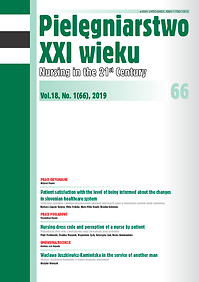The influence of shift work on health behavior and self-reported health status of nurses
DOI:
https://doi.org/10.2478/pielxxiw-2019-0005Keywords:
health behaviors, lifestyle, nursing staffAbstract
THE INFLUENCE OF SHIFT WORK ON HEALTH BEHAVIOR AND SELF-REPORTED HEALTH STATUS OF NURSES
Introduction. Working conditions often involve employees’ exposure to factors having adverse effects on their health. Due to its nature, the nursing profession entails numerous risks, associated both with harmful factors and a work system itself.
Aim. Aim of this study was to analyze the influence of a shift work system on self-reported health status and health behaviors of nurses.
Material and methods. The study included 200 nurses employed in three Szczecin hospitals: the Independent Public Clinical Hospital no. 1, Pomeranian Medical University in Szczecin, Independent Public Clinical Hospital no. 2, Pomeranian Medical University in Szczecin, and Independent Public Voivodeship Integrated Hospital. The research instruments were the Health Behavior Inventory (HBI) developed by Zygfryd Juczyński, and a self-developed questionnaire concerning sociodemographic and medical data.
Results. When it comes to 76% of the nurses, they described their health status as good or very good. The majority of the respondents (54%) displayed a low level of health behaviors. The most common work-related complaints were sleep disorders (55%), headaches after return home from work (55%), irritation after return home from work (83%), skin problems (28%), back pains (76%), leg pain/fatigue (84%), and eating disorders (14%).
Conclusions. 1. A work system had substantial effect on self-reported health status of the studied group of nurses. 2. The nurses working day shifts displayed a higher level of health behaviors than their counterparts working in a shift system. 3. A day/night shift work pattern correlated with a higher incidence of eating disorders.
References
1. Świątkowska B. Zagrożenia zawodowe pracowników opieki zdrowotnej: Co wiemy i co możemy zrobić? Probl hig epidemiol. 2010;4 (91): 522-529.
2. Wrońska I, Krajewska-Kułak E. Wybrane zagadnienia z pielęgniarstwa Europejskiego. Lublin: Czelej; 2007, s.157-202.
3. Havakuk O, et al. Shift Work and the Risk of Coronary Artery Disease: A Cardiac Computed Tomography Angiography Study. Cardiology. 2018;1 (139): 11-16.
4. Bilski B. Wpływ pracy zmianowej na sposób odżywiania się i patologię przewodu pokarmowego wśród pielęgniarek – wyniki badania pilotowego. Medycyna pracy. 2006;1 (57): 15-19.
5. Muszalik M, Kędziora-Kornatowska K, Marzec A, Klawe J. Analiza zachowań zdrowotnych, samooceny oraz zagrożenia zdrowia pielęgniarek studiujących zaocznie. Probl. High Epidemiol. 2007;3 (88): 354-359.
6. Copertaro A, Bracci M, Barbaresi M, Santarelli L. Assessment of cardiovascular risk in shift healthcare workers. Eur. J. Cardiovasc. Prev. Rehabil. 2008;2 (15): 224-229.
7. Zhao I, Bogossian F, Turner C. A cross-sectional analysis of the association between night-only or rotating shift work and overweight/obesity among female nurses and midwives. J Occup. Environ. Med. 2012;7 (54): 834-840.
8. Karlsson B, Knutsson A, Lindahl B. Is there an association between shift work and having a metabolic syndrome? Results from a population based study of 27,485 people. Occup Environ Med. 2001;58: 747-752.
9. Geliebter A, et al. Work’chift period and weigh change. Nutrition. 2000;1 (16): 27-29.
10. Marqueze EC, et al. Weight gain in relation to night work among nurses. Work. 2012;1 (14): 2043-2048.
11. Dai C, et al. The effect of night shift on sleep quality and depressive symptoms among Chinese nurses. Neuropsychiatr Dis Treat. 2019;15: 435-440.
12. Booker LA, et al. Individual vulnerability to insomnia, excessive sleepiness and shift work disorder amongst healthcare shift workers. A systematic review. Sleep Med Rev. 2018;41: 220-233.
13. Leger D, Esquirol Y, Gronfier C, Metlaine A. Shift-workers and night-workers’ health consequences: State of art and recommendations Presse Med. 2018;1 (47): 991-999.
14. Books C, Coody LC, Kauffman R, Abraham S. Night Shift Work and Its Health Effects on Nurses. Health Care Manag (Frederick). 2017; 4 (36): 347-353.
15. Lee A, et al. Night Shift Work and Risk of Depression: Meta-analysis of Observational Studies. J Korean Med Sci. 2017;7 (32): 1091-1096.
16. Anbazhagan S, Ramesh N, Nisha C, Joseph B. Shift work disorder and related health problems among nurses working in a tertiary care hospital, Bangalore, South India. Indian J Occup Environ Med. 2016;1 (20): 35-38.
17. Juczyński Z. Narzędzia pomiaru w promocji i psychologii zdrowia. Warszawa: Pracownia Testów Psychologicznych; 2009, s.115.
18. Sińska B, Kucharska A, Sienkiewicz Z, Dykowska G. Wpływ systemu zmianowego pracy pielęgniarek na ich sposób odżywiania i aktywność fizyczną. Zdrowie publiczne i zarządzanie. 2018;2 (16): 105-111.
Downloads
Published
Issue
Section
License
Copyright (c) 2019 Authors

This work is licensed under a Creative Commons Attribution-NonCommercial-NoDerivatives 3.0 Unported License.




